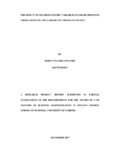| dc.contributor.author | Mwaore, Mercy W | |
| dc.date.accessioned | 2018-01-31T06:10:57Z | |
| dc.date.available | 2018-01-31T06:10:57Z | |
| dc.date.issued | 2017 | |
| dc.identifier.uri | http://hdl.handle.net/11295/102934 | |
| dc.description.abstract | The stock market facilitates the exchange of financial assets by bringing buyers and sellers of securities together. It acts as a plat foam for convergence between deficit users and excess suppliers of funds. Security markets promote price discovery of instruments traded therein and therefore play an important role in shaping stock markets performance. The study sought to examine the effect of macroeconomic variables on stock prices of firms listed on the Nairobi Securities Exchange. The macroeconomic variables studied were Gross Domestic Product mean growth rate, the unemployment rate, CBK interest rate and USD mean foreign exchange rate. The NSE 20 share index was used as a proxy for the share price. Quarterly secondary data for the period January 2007 to December 2016 from KNBS and CBK was used in the study to investigate the relationship. Multiple regression model was employed to analyze data in SPSS. The study revealed that 41.9% variations in share prices were explained by variations in the four macroeconomic variables. It was implied that 58.1% of variations in the share price was explained by other factors not included in the study. The study concluded that macroeconomic variables studied had a combined moderate effect on the share prices of firms listed in the NSE. Share prices of firms listed in the NSE were positively affected by growth in GDP and negatively affected by changes in unemployment rate, interest rate, and foreign exchange rate. It was concluded GDP had a significant positive effect on share prices, CBK interest rate and USD foreign exchange rate had a negative effect on share prices, while unemployment rate had a significant negative effect on share prices of firms listed in the NSE. Results of the study further revealed that a unit change in GDP would cause a positive increase in share price by 167.349 units, a unit change in unemployment would result to a negative change of 548.326 units in share price and one-unit change in interest rate would result to a negative change of 58.115 units in share price. A unit change in the foreign exchange rate would result in an adverse change of 26.384 units in share price. It was evident from the results that unemployment rate had the highest negative unit change in share prices than interest rate and foreign exchange rate while GDP had a high positive effect. | en_US |
| dc.language.iso | en | en_US |
| dc.publisher | University of Nairobi | en_US |
| dc.rights | Attribution-NonCommercial-NoDerivs 3.0 United States | * |
| dc.rights.uri | http://creativecommons.org/licenses/by-nc-nd/3.0/us/ | * |
| dc.subject | Macroeconomic Variables on Share Prices of Firms Listed on the Nairobi Securities Exchange | en_US |
| dc.title | Macroeconomic Variables on Share Prices of Firms Listed on the Nairobi Securities Exchange | en_US |
| dc.type | Thesis | en_US |



